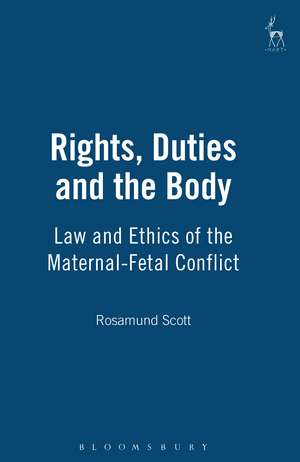Rights, Duties and the Body: Law and Ethics of the Maternal-Fetal Conflict
Autor Rosamund Scotten Limba Engleză Hardback – 4 aug 2002
Preț: 954.95 lei
Preț vechi: 1370.66 lei
-30% Nou
Puncte Express: 1432
Preț estimativ în valută:
182.73€ • 191.27$ • 152.09£
182.73€ • 191.27$ • 152.09£
Carte tipărită la comandă
Livrare economică 31 martie-14 aprilie
Preluare comenzi: 021 569.72.76
Specificații
ISBN-13: 9781841131344
ISBN-10: 1841131342
Pagini: 480
Dimensiuni: 156 x 234 x 37 mm
Greutate: 0.84 kg
Ediția:New.
Editura: Bloomsbury Publishing
Colecția Hart Publishing
Locul publicării:London, United Kingdom
ISBN-10: 1841131342
Pagini: 480
Dimensiuni: 156 x 234 x 37 mm
Greutate: 0.84 kg
Ediția:New.
Editura: Bloomsbury Publishing
Colecția Hart Publishing
Locul publicării:London, United Kingdom
Caracteristici
This study seeks to explain and justify a pregnant woman's legal right to refuse medical treatment and thus resolve the surrounding ethical, legal and social tensions.
Notă biografică
Rosamund Scott is Professor of Medical Law and Ethics at King's College, London and a barrister.
Cuprins
PART I: THE MOAL ELATIONSHIP BETWEEN A PEGNANT WOMAN AND HE FETUS: EXPLOING A WOMAN'S MORAL IGHTS AND DUTIES1. The Relation of the Fetus to the Pregnant Woman2. The elation of the Pregnant Woman to the Fetus: The Interface between her Moral ights and DutiesPART II: THE LEGAL AGUMENTS FOM IGHTS3. Introduction to the Maternal-Fetal Cases and the Law of Treatment Refusal 4. Understanding the Values Underlying and Justifying a Pregnant Woman's Legal ight to efuse TreatmentPART III: THE LEGAL AGUMENTS FOM DUTY5. "Technical" Arguments from Abortion Law6. Arguments from Tort Law7. Arguments from Rescue LawConcluding the Arguments
Recenzii
This is an insightful exploration of a difficult issue, and will be of interest to academics in law and philosophy, lawyers, policy makers, health professionals and students of medical law and ethics.
Scott is to be congratulated on a book that makes a valuable and original contribution on an important subject. Her approach is thoughtful and thorough. She identifies and confronts the issues in an honest and open-minded manner. In an area that has all too often been dominated by assertions rather than arguments, Scott offers a sophisticated approach and close and careful analysis. Her book is a rich resource.
Scott is to be congratulated on a book that makes a valuable and original contribution on an important subject. Her approach is thoughtful and thorough. She identifies and confronts the issues in an honest and open-minded manner. In an area that has all too often been dominated by assertions rather than arguments, Scott offers a sophisticated approach and close and careful analysis. Her book is a rich resource.
Descriere
This book tries to explain and justify a woman's moral and legal rights in pregnancy and explores the extent of her moral duties toward the fetus.
